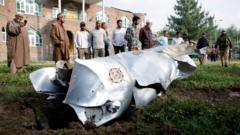A recent airstrike by the Israel Defense Forces (IDF) on a six-story apartment building in Ain El Delb, Lebanon, left 73 people dead, predominantly civilians, despite IDF claims that the building housed a Hezbollah command center. A BBC investigation revealed that only a handful of those killed had any ties to the militant group, challenging assertions made by the IDF which indicated that most victims were terrorists. The incident has raised serious concerns regarding the proportionality of military action in densely populated areas.
Deadly Bombing in Lebanon: IDF Claims Targeting Hezbollah Command Center, But Civilians Pay the Price

Deadly Bombing in Lebanon: IDF Claims Targeting Hezbollah Command Center, But Civilians Pay the Price
The aftermath of a devastating attack on an apartment block in Ain El Delb raises questions about military tactics as civilian casualties soar.
The IDF justified the strike as a tactical decision related to escalating tensions with Hezbollah, who has conducted numerous rocket attacks against Israel. Among the deceased were children, babies, and families who had sought refuge in the apartment block, believing it to be safe. Eyewitness accounts and investigations by international media, however, have shown that the majority of victims were innocent civilians, wrongfully caught in the crossfire. Subsequently, this assault has sparked an outcry over the rules of engagement and the consideration given to civilian life during military operations.
Survivors recount harrowing experiences, with many stating they received no prior warning before the attack. Reports of military strikes resulting in high civilian casualties in Lebanon raise flags regarding compliance with international humanitarian law, especially given the ongoing conflict’s historical context.
Families continue to mourn their losses and seek justice, questioning the validity of military objectives that result in such devastating human costs. The IDF maintains that due diligence and precautions are observed during targeting, yet the discrepancy between their claims and the tragic reality of the victims prompts deeper reflections on the ethics of warfare, particularly in politically complex regions like Lebanon.
As the situation unfolds, humanitarian organizations and global observers call for scrutiny over military actions that disproportionately affect civilian populations, urging the involved parties to engage in dialogue to prevent further loss of innocent lives.
Survivors recount harrowing experiences, with many stating they received no prior warning before the attack. Reports of military strikes resulting in high civilian casualties in Lebanon raise flags regarding compliance with international humanitarian law, especially given the ongoing conflict’s historical context.
Families continue to mourn their losses and seek justice, questioning the validity of military objectives that result in such devastating human costs. The IDF maintains that due diligence and precautions are observed during targeting, yet the discrepancy between their claims and the tragic reality of the victims prompts deeper reflections on the ethics of warfare, particularly in politically complex regions like Lebanon.
As the situation unfolds, humanitarian organizations and global observers call for scrutiny over military actions that disproportionately affect civilian populations, urging the involved parties to engage in dialogue to prevent further loss of innocent lives.



















